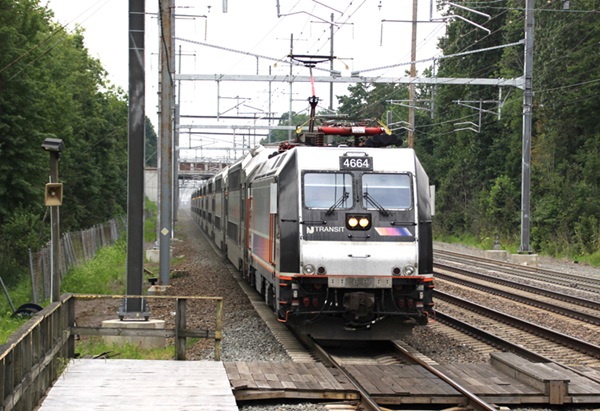
NEWARK, N.J. — An NJ Transit engineer whose career was ended by injuries suffered when he passed out in the cab of a locomotive with non-functioning air conditioning was awarded $11.6 million by a jury, NJ.com reports.
Scott Lupia, 47, filed a Federal Employer’s Liability Suit after a July 21, 2020, incident in which he was ordered to operate a Morristown Line train whose locomotive reached a cab temperature recorded at 114 degrees by a trainmaster, according to court documents. He could have been fired for refusing to do so, according to the suit.
He eventually passed out, but first was able to make an emergency call for help and activate emergency brakes to stop the train in Summit, N.J. When he passed out, he hit his head on metal in the cab and suffered permanent hearing loss, eyesight damage, and almost constant balance and dizziness issues, Lupia’s attorney, Scott Fitzgerald, told NJ.com.
Questions during the trial asked why Lupia didn’t open a cab window, but NJ Transit operating rules require that an engineer’s face and head cannot be exposed to a window opening, limiting opening of the window to about an inch. And the ALP46 electric locomotive involved in the case generates heat as it operates; expert testimony during the case said an open window sucks in hot air from the locomotive’s motors.
Fitzgerald said the award “comes as close as possible to value the many losses [Lupia] sustained as a result of the railroad’s outrageous negligence.” NJ Transit did not respond to NJ.com’s request for a comment.













My great grandmother told me once that she didn’t have air conditioning until after my grandmother was born and she was the baby out of seven children. But she said she was used to it. It sucked but a person in that day and age was used to it because they never had it. It was nothing for us to visit her on hot days and only the windows were open and it was so hot inside it would take your breath away.
My grandmother said that she was used to it because she grew up without it mostly. Even though they got it after she was like five or six but they hardly used it. But even being used to it didn’t mean that she wanted to live that way. She loved her air conditioning up until the she died.
My last comment, the HVAC system needs to work to protect the electronics.
It may be that is the extent of the injuries suffered by Scott Lupia. He certainly is not going to continue as a locomotive engineer.
The judge may still reduce the size of the juries judgement. It is not uncommon for a judge to sit on a juries find-ing(judgement). Many times a judge will see a juries finding as a way to send a message to a defendent that a change is necessary. The judge will then sit on the juries findings until the press has gone away and make a more proper amount. A judge who continues to allow bad judgements to go to the next level of appeals gets attention from the judicial system.
Lawyers who don’t understand this do not serve their clients, both plaintiffs and defendents.
At the risk of offending, some of you who have graciously read my musings of life on the railroad, I feel compelled to respond to some of the comments here.
Back in my early years with Amtrak, I was talking to the late Graham Claytor at lunchtime, and used our congenial meeting as an opportunity, as a local union official, to ask the head man, in a friendly manner, why we could not have air conditioning on our locomotives. Claytor, who I had known, since Southern’s steam program, made the same argument that a couple of contributors have offered. He asked if I’d be saying the same thing were I operating the 4501 in the summertime. I countered by asking him if he would continue to allow members of his headquarters staff to go home, if the heating or air conditioning failed during extreme weather in a building whose windows were sealed shut. Point well taken.
You see, today’s railroaders live in the same world in which you and I live—a world in which air conditioning is universal and taken for granted. As a small child, when our family was looking for lodging on vacation, our family sought out a place to stay overnight, where the neon sign outside said, “air-conditioned.“ I’m not aware of modern building practices that do not include central air conditioning in climates where temperature and humidity would normally demand it.
I reminded the “old man,” as we lovingly referred to him, of the extremely hot summer day that I was operating the Palmetto through North Carolina, when he accompanied me in the cab. As we slowed for the 70 mile an hour curve at Halifax, he joined me in exchanging friendly waves an elderly lady, in a rocking chair, in the shade of the front porch of a falling down old tar paper shack in the middle of a field of tobacco. It was sweltering. I made the comment, that she must be suffering. Claytor looked at me and said, “I’ll bet, she’s never had air conditioning in her life, and wouldn’t know what to with it. We have it, and don’t know how we’d get by without it.“
I went on to explain to Mr. Claytor, that the reasons, necessitating an air conditioned locomotive cab, were too great to be ignored, and involved keeping the windows closed as much a matter of safety as mere comfort. The occupants of a locomotive cab, especially in urban areas, are subject to having rocks, bricks, and anything else that could be picked up, thrown at us. Career ending, and debilitating injuries, are not uncommon. For this reason, the FRA mandates certain types of glass, designed to withstand such missiles.
Some years ago, Norfolk Southern was ordering locomotives from General Electric, and specified that they did NOT wish to include air conditioning, citing it as a frivolous employee demand. GE explained that while they could comply with NS’s demand, that because the locomotive was controlled by computers, it would not be able to warrant the new diesel, electrics, because extreme temperatures would render the electronics useless during extreme temperatures.
As far as this specific monetary award to the badly injured employee is concerned, lawsuits brought under the Federal Employers, Liability Act (FELA), are meant as much to warn railroads of the consequences for ignoring safety issues, in an admittedly dangerous industry, as they are intended to compensate workers, or their families, for preventable deaths, or injuries. FELA, which is applicable almost exclusively to the railroad industry, simply states that railroads must provide their employees with a safe place to work, and the proper tools with which to do their job. Failure to do so, exposures the rail, road to liability, and in some cases, the results are extremely large and usually precedent setting—the stick when the carrot fails to work.
Such is the world in which I managed to survive for 35 years—one which may be difficult for some non-railroaders to comprehend.
Thank you for that story Mr. Riddell. Talking about the Palmetto through Halifax in North Carolina, I don’t live too far away from there and started my law enforcement career as a Halifax county deputy before becoming a Roanoke Rapids police officer. I’m retired now, but I know where you’re talking about as I railfan in that area sometimes.
Thanks again for that story.
At the risk of offending, some of you who have read my musings of life on the railroad, I feel compelled to respond to some of the comments here.
Back in my early years with Amtrak, I was talking to the late Graham Claytor at lunchtime, and used our meeting as an opportunity, as a local union official, to ask in a friendly manner, why we could not have air conditioning on our locomotives. Claytor, who I had known, since Southern’s steam program, made the same argument that a couple of contributors have offered. He asked if I’d be saying the same thing were I operating the 4501 in the summertime. I countered by asking him would he allow members of his headquarters staff to go home, if the heating or air conditioning failed during extreme weather in a building whose windows were sealed.
You see, today’s railroaders live in the same world in which you and I live—a world in which air conditioning is universal. As a small child, when our family was looking for lodging on vacation, our family sought out a place to stay overnight, where the neon sign outside said, “air-conditioned.“ I’m not aware of modern building practices that do not include central air conditioning in climates where temperature and humidity would demand it.
I reminded the “old man,” as we lovingly referred to him, of the extremely hot summer day that I was operating the Palmetto through North Carolina, when he was in the cab with me. As we slowed for the 70 mile an hour curve at Halifax, he joined me in waving at an elderly lady, in a rocking chair in the shade of the front porch of a falling down old tar paper shack in the middle of a field of tobacco. I made the comment, that she must be suffering. Claytor looked at me and said, “I’ll bet, she’s never had air conditioning in her life, and wouldn’t know how to live with it. We have it, and don’t know how we’d get by without it.“
I went on to explain to Mr. Claytor, the reasons, necessitating and air conditioned locomotive cab, were too great to be ignored, and involved keeping the windows closed as a matter of safety as much is comfort. The occupants of a locomotive cab, especially in urban areas, are subject to having rocks, bricks, and anything else that could be picked up, thrown at us. Career ending, and debilitating injuries, are not uncommon. For this reason, the FRA mandates certain types of glass, designed to withstand such missiles.
Some years ago, Norfolk Southern was ordering locomotives from General Electric, and specified that they did NOT wish to include air conditioning, citing it as a frivolous employee demand. GE explained that while they could comply with NS’s demand, that because the locomotive was controlled by computers, it would not be able to warrant the new diesel, electrics, because extreme temperatures would render the electronics useless during extreme temperatures.
To be an engineer in the days of steam locomotives, you had to be made of tough stock and a man of steel. Consider the engineer’s work outfit long sleeved flannel shirt, heavy denim overall and pants, work boots that weighed several pounds heavy wool socks, gloves and an engineer’s cap plus googles to protect the eyes from sparks and cinders. The fireman’s job wasn’t much easier Being on your feet for several hours swinging a heavy shovel and putting coal in the firebox and of course working in an environoment with temperatures over 100 degrees or more. By the end of their run both engineer and fireman were ready to jump into a cold refreshing shower after peeling off their work clothes soaked through with sweat and dirt. Yet when you read stories and accounts of railroaders who worked under these conditions, you never heard any complaining or grumbling about their jobs. If anything it encouaged small boys growing up to be engineers or go railroading when they grew up. The early diesel and electric locomotives didn’t have a/ either and the same could be said for streetcars, subway and el cars and the early buses that replacedthe streetcars. Today’s engineers never had it so good. A climate controlled cab with a/c {when working} a desktop console with pushbuttons and a joy stick to operate the locomotive and a computer screen No more heavy levers and throttles and brakes to operate or control. As a matter of fact. in some countries, the enginerr or as they are called today train operators come to work wwearing suits and ties very much like somebody working in an office building. Besides with most if not all locomotives and trainsets, it is the onboard computer system really operating and controlling the train’s speed and other functions.
Joseph C. Markfelder
There is quite an argument on what temperature the human body can survive at, I’ve seen anywhere from 35.8 C to 60 C. It depends on other factors besides temperature, such as humidity and access to cool water. You can mitigate the potential problems from overheating, besides the fact that $11.6 million dollars is just extravagant. Unless you’re in a care facility requiring 24/7 nursing he’ll never go through that amount of money, the whole system needs to be revamped and awards made more in line with what the actual damages are…and yes, I’m saying you can put a price on human life.
Unless it’s you or one of your loved ones that’s been injured Mr. McFarlane, then what be the price?
And 11.6 million isn’t extravagant anymore. They can absolutely go through that amount of money very quickly. In less than a year even. Buy a nice house and a nice car or have an expensive collecting hobby and poof the money is gone.
49CFR229.119 (h) Each air conditioning unit in the locomotive cab on a locomotive identified in paragraph (g) of this section shall be inspected and maintained to ensure that it operates properly and meets or exceeds the manufacturer’s minimum operating specifications during the periodic inspection required for the locomotive pursuant to § 229.23 of this part.
It’s the engineer responsibility to refuse a non-compliant locomotive. It’s the railroad’s responsibility to provide a locomotive that meets the requirements of a periodic inspection.
A film documentary made of the last GG1s clearly shows locomotive engineer Cliff Underwood operating a GG1 with the windows open.
Did ANY of you read the article? ANY?
He couldn’t open the window because that was prohibited and sucked in hot air anyway. And the man was seriously injured, and can no longer work. Have some compassion, and stop trying to diagnose him from an article you didn’t even bother to read.
And have you ever experienced 114 degrees? I have. You get dehydrated VERY VERY VERY quickly. You must be constantly drinking water (if your pee is not clear you’re not drinking enough water is the mantra).
Thank you Mr. Friedman.
Doesn’t matter what body type he has, seems NJ transit found him fit to work that day. Making comparisons to long ago steam locomotives and no A/C is stupid. If passengers had no A/C on the train comments about NJ Transit would all be negative. Doubt anyone here is volunteering to ride on a 114 degree commuter train or work in a 114 degree office.
Laurence — Gerald McF can be a hard-ass on labor issues but he may have a point here. The jurors don’t have MD licenses either.
Thousands of locomotives have gone millions of miles without a cab A/C, working or otherwise. I’m no expert on steam, but think about being a steam fireman in Texas or Florida or Guatemala in the days when no one ever heard of A/C.
What was his body type and did he not have an adquate supply of water with him to keep hydrated? 114 degrees should not have caused him to pass out.
I don’t see MD after your name. Are you a doctor? Do you have relevant medical knowledge to make such a claim? I imagine that medical professionals would have testified at such a trial.
The cabs of steam engines were pretty open to the air I seem to recall, in the winter the crew roasted on one side and froze on the other. Of course, this isn’t 1950, you would think NJ Transit could have working AC in the 2020s. Sure, conditions may not have been better for decades on most railroads, or even better today, but the employee was injured on the job due to the conditions on the jobsite, seems reasonable that the employer NJ Transit is held responsible and force to compensate the employee. Lesson learned, make sure the AC works or it may cost you 🙁